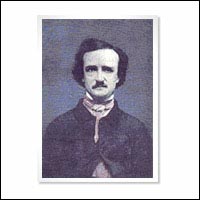 In his poetry, Edgar Allan Poe shines best as a master-craftsman, writes professor of English Killis Campbell of the University of Texas in his essay, "His [Poe] Creed and Practice of Poetry." Campbell sums up the best of Poe’s poems as “a melody incomparable so far as the western world is concerned; and he has achieved an all but flawless construction of the whole in such poems as “The Raven”….”
In his poetry, Edgar Allan Poe shines best as a master-craftsman, writes professor of English Killis Campbell of the University of Texas in his essay, "His [Poe] Creed and Practice of Poetry." Campbell sums up the best of Poe’s poems as “a melody incomparable so far as the western world is concerned; and he has achieved an all but flawless construction of the whole in such poems as “The Raven”….”Campbell’s superlative assessment of Poe’s poetry is accompanied by specific examples, such as: “While in 'The Bells' he [Poe] has performed a feat in onomatopoeia quite unapproached before or since in the English language.” Another example that Campbell notes is Poe’s “perfection of phrase” and a “vividness of imagery, that it is difficult to match elsewhere in American poetry.”
According to Campbell, the disparity is wide between Poe’s “best and worst verse.” One can argue that, considering Poe’s struggle with clinical depression, his work would reflect the ebbs and flow of poor health. It could also account for his narrow range in ideas, which Campbell remarks is “narrower than that of any other American poet of front rank.”
Although “most” European critics distinguish Poe in first place among American poets, Campbell asserts that most American critics “have hesitated to accept their verdict.”
Poe's best poems, says Campbell, stem from his “never-ending revisions." He cites “The Raven” as one of Poe's best, because it underwent a dozen variations. Poe’s final version was “scarcely recognizable” from some of his earlier renditions.
Campbell contends that some of Poe’s poems “approach too near to the melodramatic; and that, with many readers, his verses must suffer by reason of their somberness of tone.” Again, if one overlays the template of debilitating depression over Poe’s writings, the “somberness of tone” is reflective of the lens of melancholy.
To the hundreds of thousands of people that experience depression, Poe's literary depictions of its dark shadows demonstrate the veracity of his rhetoric.







No comments:
Post a Comment